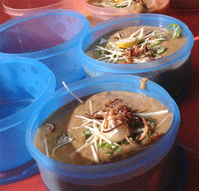May 14, 2000. A bus load of volunteers and myself head to the Thar desert. We set up a relief collection point in Indus Valley School, and plan to participate in the distribution of the relief goods. Our leaders in this campaign are the Raasta Development Consultants’ people. We are met by the staff of the Thardeep Rural Development programme and we attend the food distribution. We see some dead animals on the way.
On our return, we set up a multimedia kiosk at the school and have an expanded collection point in operation. We make it a point to accept no cash, only oil tins and ‘aata’ (wheat flour). The people of Karachi are galvanized through this word of mouth campaign and the volunteers at Raasta are encouraged to expand the scope of their work to other areas of Sindh and Baluchistan as well.
May 28, 2000. I am on the way to Dadu district for another round of food distribution. At this point I start to wonder about the nature of the ‘famine’ since there has been a bumper harvest of wheat in that area. We return to Karachi with a feeling that food aid can be a dangerous business, because at the end of the day a bag of wheat is a commodity.
June 17, 2000. Onwards to District Naushki located at the edge of Baluchistan. We arrive from Peshawar and set up a camp at a government rest house. We start distribution the next day in the dry heat of the desert, and it is here that we actually meet the homeless people living in extreme poverty.
The driver of one of the pickups that we are using reminds me that God is the provider for all, and our efforts are mostly in vain. He says to me: “How many meals have you brought? For how long will these meals last?” This makes me realize that it is the effort that matters and activity in food distribution is cathartic.
In Naushki, I remember one of the old women in a makeshift camp next to the main road saying that she was glad for the famine, because this was the first time she had left her village. Any developmental theory is thrown out of the window with such comments!
Lessons Learnt from this Exercise:
It is useless doing this alone and collaboration is more effective. The success of the exercise hinged on the linkages that Raasta had with other NGOs in each of the areas that we operated.
It is better to work with the government so that security is provided at each place.
People would rather give goods than cash.
Fast Forward to 2006
I have fond memories of the times we spent with the Raasta crew in 2000, and want to start something on a regular basis. The plan is to start some food distribution exercise with the meat from Qurbani at Eid-ul-Azha. We distribute raw meat as a tradition, but it is better if we provide cooked meat to the poor so they can have a decent meal.
By some coincidence of fate, I get in touch with the Concern for Children (CFC) NGO, which serves the Machar colony in Karachi. We agree to work with them to provide meals to the shrimp peelers, who are landless immigrants of Bangladeshi descent. They work in appalling conditions and have no recourse to law since they are not citizens of Pakistan.
January 7, 2007. 9:00 am. The haleem is almost ready. It’s time to leave the kitchen where the 700 odd meals were cooked. The CFC team has done well to set up a distribution point at their clinic in Machar colony. We quickly get through the meals, and don’t have to deploy the plain clothes police men on duty.
A very satisfying day indeed.
January 12, 2008. We have to decide whether the situation will allow us to operate in the tension-filled areas this year, but the clouds clear and we proceed with the distribution of our projected number of meals amid chaos.
There is chaos because the coupons had been distributed a month ago, and the chaos in the city results in delays in the distribution. We take assistance from the uniformed police for this distribution – something that we wanted to avoid at all costs, but the situation does not allow us to do so.
Lessons Learnt from this Exercise:
Regular charity is the best charity.
Food aid needs organization, and primarily it needs security. In a nation where crime is common, you need to protect yourself and your volunteers first.
There needs to be clear command systems in aid exercises and volunteers cannot be allowed to make whimsical decisions.






